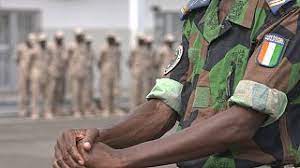Despite the signing of a memorandum between Abidjan and Bamako, the 46 Ivorian soldiers detained in Mali since July 2021, were convicted and handed down a heavy sentence.
After six months of pre-trial detention, the soldiers arrested in July for being alleged mercenaries were tried by a Malian court.
At the end of a two-day trial, the soldiers, who were accused by the prosecutor’s office of “undermining the external security” of Mali, were sentenced to 20 years in prison, while the three women in the group, who were released last September, were sentenced to death.
This verdict by the special criminal court in Bamako took many by surprise.
“I find the sentence heavy, even very heavy,” said a Malian political analyst who requested anonymity.
“Justice could and should have been lenient,” he said, especially since “steps are being taken” by the authorities of both countries to find a way out of this crisis.
On the eve of the trial, Bamako received an Ivorian official in the frame of the Minister of State for Defense, Birahima Tene Ouattara.
The younger brother of President Alassane Ouattara, who was able to meet with the 46 Ivorian soldiers, signed a deal with the Malian authorities in the spirit of settling the dispute amicably.
As a result, the trial was considered by many observers as a prerequisite for the release of these soldiers; except that things do not seem to have gone as planned.
Ivorian political analyst Yannick Houphouet Kouablan believes that “the 20-year prison sentence for the detained soldiers is purely symbolic, and is still part of the Malian transitional authorities’ desire to assert their sovereignty and present themselves as guarantors of their country’s territorial integrity.”
In the face of what looks like a stalemate a presidential pardon remains the only hope for supporters of a negotiated solution.
But five days later, there has been no decision from Bamako, raising fears of new sanctions against Mali, especially since this option has not been ruled out by the Economic Community of West African States (ECOWAS).
At its December 4 summit in Abuja, the regional bloc demanded the release of the Ivorian soldiers before January and hinted at new sanctions, after a six-month embargo in response to the refusal of the transitional authorities to return to constitutional order as soon as possible.
In the case of the Ivorian soldiers, brandishing this card is seen as a bad option for the grouping.
“Any pressure from ECOWAS on this issue is likely to be counterproductive,” the Malian political analyst warns, favoring instead mediation led by Lomé from the start.
“It must rely on Togo for a successful outcome, rather than seeking to punish Mali again,” he admonishes.
Yannick H. Kouablan is convinced that the lack of reaction from ECOWAS since the end of the ultimatum “could be interpreted as a desire to give priority to missions of good offices, in order to find a happy ending,” while “the Ivorian side remains confident, as President Ouattara indicated during his address to the nation, indicating that the soldiers detained in Bamako will soon return home.”
According to him, the planned visit by Togolese President Faure Gnassingbe on Wednesday could help speed up their early release.
AC/cgd/fss/asAPA


